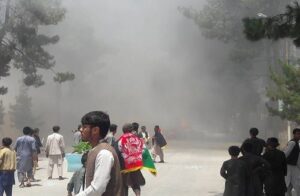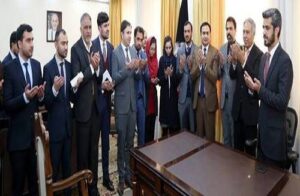By Firdos Kawish
KABUL (SW): As reports about a full blown military operation in the northern Faryab province emerge, take a look at the dynamics of militancy in this ethnic Uzbek majority part of the country.
Taliban and their Uzbek allegiances have long been active in this province. Taliban’s Uzbek allegiances are fighters affiliated to Harakat-ul-Islami Uzbekistan (Uzbekistan Islamic Movement), which was established by Tahir Youldash and Juma Namangani aimed at creating an Islamic Emirate in Uzbekistan and all over Middle Asia.
During Taliban reign, this organization was allowed to be based in Afghanistan and Tahir Youldash, the founder of the organization, won the trust and attraction of Al Qaeda Chief Osama bin laden.
The organization was provided with Al-Qaeda’s training camps and received money from Bin laden while Tahir Youldash also grew close relations with Mullah Muhammad Omar, the Taliban supreme leader.
Tahir Youldash and his men had great influence during Taliban regime in Uzbek –populated regions in the north of the country.
There are videos of him making speeches in Uzbek language. He has also written many hardliner blogs enticing his followers to violence.
In these videos, he bad-mouthed Gen. Abdul Rashid Dostum, the Vice President and have asked Uzbeks to help him topple the regime of Islam Karimov, the President of Uzbekistan.
Juma Namangani, one of Youldash’s comrades, had several interviews with BBC Persian when Taliban were still in power. He accused Islam Karimove of supporting and strengthening General Dostum against Uzebkistan Islamic Movement.
It is important to note the Afghan VP has considerable following the north-western parts of the country. Dostum established the Junbish party in the early 90s.
In a bid to counter Dostum’s influence in the Uzbek-populated areas, Uzbekistan Islamic Movement started terrorizing Dostum’s close aides and many got killed.
Following the fall of Taliban’s regime, Youldash and his fighters sought refuge in North Waziristan. Juma Namangani was killed in a drone attack and Tahir Youldash’s men soon fell into fighting with local Taliban in Waziristan.
It appeared that local Taliban did not get along well with Uzbek fighters.
Uzbek fighters have also had basis in Zabul province and they were involved behind the abduction of 31 Hazara passengers earlier this year (2105). From this southern province, the UIM fighters marched upwards back to Faryab.
2009 onwards, the militants’ influenced grew in Faryab.
Some analysts argue that “political isolation” of Dostum during Hamid Karzai’s government helped the militants gain grounds in the Uzbek heartland. Similarly, in neighboring Balkh province, he lost his power to Atta Mohammad Noor, the current Acting governor.
Dostum however, has been blamed by the UN for committing human rights violations during his military activities.
Taliban and their Uzbek allegiances took full advantage of apparently weakening Dostum and extended their influence to Jawzjan and Sar-e-pul provinces.
Currently, significant parts of Faryab, Jawzjan and Sar-i-pul provinces are under Taliban and their Uzbek allies’ control. Turkey’s politics is also a reason for insecurity in Faryab.
Some officials related to Karzai government have stated in their private meetings that the Turkish forces encouraged some militants to train and have bases in these areas for their activities in the Xinjiang, China.
Karzai later tried to abandon these bases and even handed over a number of Uyghur fighters to Beijing.
All in all, these events have made situation complicated in Faryab.
Dostum got back into the driving seat as he joined the new President Mohammad Ashraf Ghani as Vice President. He immediately took a trip to the north and tried to mop-up Taliban and their allies from the Uzbek-populated villages.
Inayatullah Babar, a parliamentarian from the Jawzjan province recently told SW that after consultations with the President and the National Security Council, Dostum would lead the operation in Faryab that would include personnel from the Afghan National Army (ANA), Afghan National Police (ALP) and the National Directorate of Security (NDS).
“God willingly, in two days the operation would commence”, he said. Babar added that so far, the militants were given time to give-up arms and join the peace process.
ENDS
Disclaimer: SW reserves the rights to agree or disagree with the opinions of the independent authors.





